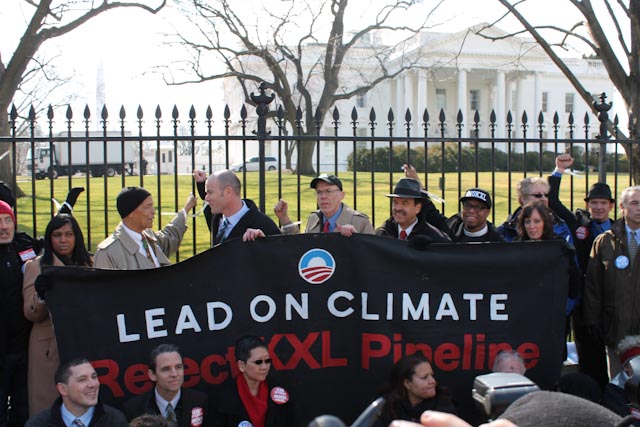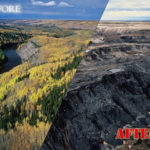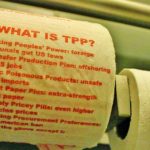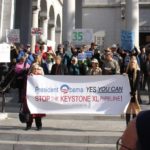As regular readers know, I believe the Obama administration should approve the Keystone pipeline, which would transport oil mined and processed from the tar sands of Alberta, Canada, to refineries in the Gulf of Mexico. — Joe Nocera, “New York Times”


A Direct Response to Joe Nocera’s Op-Ed in the New York Times
By Peter Jefferson Nichols
Josh Fox, the creator of the whistle blowing documentary that made flaming faucets famous, “GasLand,” made a sequel short film called “The Sky is Pink.” In it he chronicles the difference between “investigative” journalism and “he said/she said” journalism. It is available for your viewing pleasure here. http://vimeo.com/44367635
Inspired, I’ve decided to textually mimic his process. I will respond as directly and as frequently as possible to writing that I find dangerously, willfully misleading.
First up, Mr. Joe Nocera, and his New York Times op-ed, “How Not to Fix Climate Change,” published on 19 February, 2013. http://www.nytimes.com/2013/02/19/opinion/nocera-how-not-to-fix-climate-change.html?_r=1&
Dear Joe,
This letter is in response to your “How Not to Fix Climate Change” Op-ed.
Almost immediately, you name-dropped individuals I greatly respect, James Hansen, Bill McKibben and Michael Brune. I continued on to find that you limited Hansen’s belief that our country ought to move away from fossil fuels to him as an individual. I would like to inform you of the CarbonTracker report titled “Unburnable Carbon,” as well as the HSBC/Aviva-funded project to identify stranded carbon assets. The climate crisis is no longer something predicted by our scientists, it is known and acted upon by our financial intelligentsia. Have you heard of Tom Steyer?
Into the second paragraph, are you aware that tar sands are already refined in the good ole U.S. of A. and being combusted in the engines of farm equipment across the Midwest? A tar sands bitumen pipeline leading to refineries in Illinois crosses my maternal grandmother’s farm in Walworth Wisconsin. Are you aware that the segment of pipe under construction between Cushing, Oklahoma and Port Arthur, Texas, at the behest of TransCanada, a foreign corporation, if completed would subject that captive supply to the bidding of the global market? Wouldn’t that scenario increase the stress already felt by those Midwesterners, the folks hit hardest by last summer’s drought? Who would benefit? Have you read the Greg Palast article in Vice, titled “Hugo Chavez Told Me He Won’t Sell to the Kochs?”
Fourth paragraph, Yes the great Cornhusker State just dropped its official opposition to the proposed Keystone XL, but did you read the December 7, 2012, Huffington Post piece by Ted Genoways? It definitively establishes the existence of a glaring conflict of interest concern between the firm, HDR Engineering Inc., hired by Nebraska to conduct the Environmental Impact Assessment on the KXL and TransCanada. Here’s a loud quote, “HDR was hired by TransCanada in 2009 to help build a $1.2 billion natural gas-fired power plant in Ontario.”


Then consider the question of defective pipe laid in Texas for the southern leg of the KXL: http://www.desmogblog.com/2013/02/06/transcanada-laying-defective-keystone-xl-pipeline-texas
As a side-note, I too have heard the threats of exporting to China. But to me they ring empty, more on that later…
The Relationship Between Ecology and Economy
In fact, this should be a no-brainer for the president, for all the reasons I stated earlier, and one more: the strategy of activists like McKibben, Brune and Hansen, who have made the Keystone pipeline their line in the sand, is utterly boneheaded. – Joe Nocera in the “New York Times”
Fifth paragraph, my above responses go a long way toward making your “no brainer” assertion sound dangerously hyperbolic. Dare I write “boneheaded?” Oh, and McKibben, Hansen and Brune on the other hand are acting with remarkable tact and grace. The Keystone XL is a great line in the sand. It requires an executive approval because it crosses an international boundary. That approval will come from President Obama. It is rare that a head of state can make such a definitive “Yeah” or “Nay” declaration. And should President Obama reject the project based off of its adverse climatic effects, he would become the first world leader in a long time to explicitly recognize the mutually beneficial relationship between ecology and economy. It would signify leadership.
It would be consistent with the rhetoric of the recent State of the Union address where he stated “For the sake of our children and our future, we must do more to combat climate change. Yes, it’s true that no single event makes a trend. But the fact is, the 12 hottest years on record have all come in the last 15. Heat waves, droughts, wildfires, and floods – all are now more frequent and intense. We can choose to believe that Superstorm Sandy, and the most severe drought in decades and the worst wildfires some states have ever seen were all just a freak coincidence. Or we can choose to believe in the overwhelming judgment of science – and act before it’s too late.”
Paragraph six, you rehash well Brune and McKibben’s logic. However the article you link to for the “Plan B” is really quite outdated, over a year old. Though to its credit it documents Canada’s own struggle to approve construction of a pipeline, stating that they delayed Enbridge’s proposed Northern Gateway project after receiving over 4,500 requests to make public comment. Additionally you don’t mention Plan C, Enbridge’s potential reversal of the existing Line 9 in New England or the dramatic resistance that notion has conjured. Finally, you omit the different agents acting in solidarity with Canada’s First Nations. Have you yet caught wind of “Idle No More?” It is a bit more difficult to evict than Occupy was. Its roots run deep.
Just to be clear, it doesn’t matter how deep the planning gets into the 26 letters of the alphabet, blockaders will not let Albertan tar sands get to China. Stop worrying. And read this article, http://www.rtcc.org/china-announces-carbon-tax/
The assumption of the activists is that by choking off the supply of new oil sources like the tar sands, the U.S. — and maybe the world — will be forced to transition more quickly to green energy. Can you see how backward this logic is? – Joe Nocera
Paragraph seven, here is where you really lose me, To answer your first rhetorical, “No, I cannot see how backwards their logic is.” Your reasoning on the other hand seems inverted at best and baseless at worst. Adam Brandt sounds smart. Yes, markets are consumer driven. However, fossil fuel companies are experiencing a real and present threat to their consumer constituency: CLIMATE CHANGE. Here’s an article that states 400,000 people are already dying every year as a result, http://www.thedailybeast.com/articles/2012/09/27/climate-change-kills-400-000-a-year-new-report-reveals.html
Overcoming our Fossil Fuel Addiction
The U.S. military is the single largest consumer of fossil fuels on the planet. And they are trying to change that. In 2008, the Defense Science Board Task Force on Department of Defense Energy Strategy released its findings in a seminal report called “More Fight-Less Fuel.” It stated the “two primary energy risks to the DoD” as:
1) Unnecessarily high and growing operational fuel demand increases mission risk.
2) Critical missions at fixed installations are at unacceptable risk from extended power loss.
Since then we have been building Drone bases like ants build hills, everywhere we can. Why? It’s not because they risk the lives of our military personnel less. It is because they require less fuel to propel than do aircraft carriers. Investments like drones, which I do feel profoundly conflicted about, will reduce the demand for fuel. But they are not alone; please refer to 350.org for an up-to-date panorama (from transition towns, to greening portfolios, to solar feed in tariffs) of how and why folks are weaning themselves off the fossil fuel junk.
To answer your second rhetorical, “Yes. Environmental groups, I prefer to call them climate justice advocates, can expect to win a series of fights for decades to come because, contrary to your loaded enquiry, economic forces are aligned with them as opposed to against them.” Refer back to that CarbonTracker report or the HSBC/Aviva-funded project. Again, who is Tom Steyer? Unfortunately for the fools who invested over $100 billion in Alberta’s Tar Sands, the economic need for that unconventional combustible is evaporating faster than kerosene exposed to normal atmospheric temperatures and pressures.
Paragraph eight, here I have a question for you, could you please explain why you believe civil disobedience, or non-violent direct action, are ineffective tactics in actualizing paradigmatic change? Could you please refer to India’s struggle for independence, as well as the Civil Rights Movement in the United States? Could you please read “A Letter from a Birmingham Jail?”
Until the next time, of course.
Peter Jefferson Nichols
P.S.
After working at Morgan Stanley and Goldman Sachs, Tom Steyer founded Farallon Capital Management, a $20 billion hedge fund, which he left last year to devote himself fulltime to public sector work. He was among the first American billionaires to pledge, alongside Warren Buffett, to give away at least half his fortune. To that end, he has given large gifts for environmental research and stewardship to Stanford, where he is on the board of trustees. He also gave $22.5 million to fund the founding of OneCalifornia Bank, which his wife Kat Taylor now runs. A “community development bank,” it provides banking services to under-served communities and nonprofits on the Pacific Coast.
He recently wrote in a letter to the Middlebury College Board of Trustees, “I can tell you that in my own investments, I have directed my financial team to divest my holdings of fossil fuel investments so that I will have a fossil fuel free portfolio myself – in part because I am convinced it will outperform the market.”
For other reading: please see…
Wen Stephenson’s piece in The Phoenix.
http://thephoenix.com/boston/news/151670-new-abolitionists-global-warming-is-the-great/













Pingback: A New York Times Columnist's Misguided Crusade - Peter Nichols | WilderUtopia.com